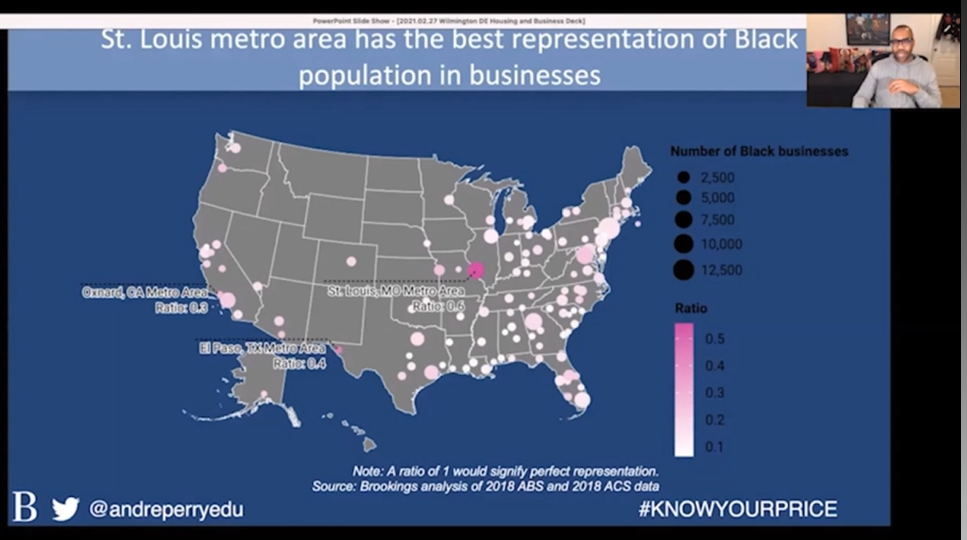When you hear the word “underrepresented” in terms of entrepreneurship, think about this:
Only 2.7% of the businesses in the Philadelphia-Camden-Wilmington area are Black-owned. The Black population in the metro area, including suburbs, is 23%, or 3,059 out of 113,000 businesses. So, if Black businesses were represented equivalent to population, there would be 29,000 more Black owned businesses.
That’s 29,000 Black employers, families and opportunities for intergenerational wealth.
For Wilmington, a majority Black city, proportional representation would mean that nearly 60% of the city’s businesses were Black owned.
Wilmington isn’t even close, and we’re not alone. No U.S. City has a proportional ratio of Black-owned businesses to Black population. The St. Louis Metro area comes closest, with the percentage of Black businesses coming close to half of the percentage of Black people.

(Screenshot)
This data comes from Andre Perry, author of the book “Know Your Price: Valuing Black Lives and Property in America’s Black Cities,” the first speaker of Wilmington Alliance’s recent Yes, Wilmington event, which took a hard look at some of the racial inequities the city faces, as well as a look forward toward solutions.
Perry, who is from Pittsburgh but has tries to Wilmington as a onetime resident of Trolley Square, spoke about devaluation, a topic he knows well, and how to counter it.
How does a city counter something as deeply ingrained as devaluation of Black neighborhoods, homes and businesses? Perry says it starts with targeted investments in people and places who are currently undervalued — more revitalization projects like REACH Riverside and more investment in Black business owners, both in areas like downtown and in the neighborhoods that surround it.
It also requires divesting in racism through policy changes.
Wilmington Alliance has made the talks from Yes, Wilmington available for free; each is about 30 minutes long and all are well worth watching. In addition to Perry’s talk, the event also featured Lyneir Richardson, executive director of Rutgers Center for Urban Entrepreneurship and Economic Development, and Samira Cook Gaines of Rising Tide Capital, a New Jersey nonprofit that funds underrepresented entrepreneurs and provides business acceleration services.
Watch them here or on the Wilmington Alliance YouTube channel:
Before you go...
Please consider supporting Technical.ly to keep our independent journalism strong. Unlike most business-focused media outlets, we don’t have a paywall. Instead, we count on your personal and organizational support.
Join our growing Slack community
Join 5,000 tech professionals and entrepreneurs in our community Slack today!

The person charged in the UnitedHealthcare CEO shooting had a ton of tech connections

From rejection to innovation: How I built a tool to beat AI hiring algorithms at their own game

Where are the country’s most vibrant tech and startup communities?


